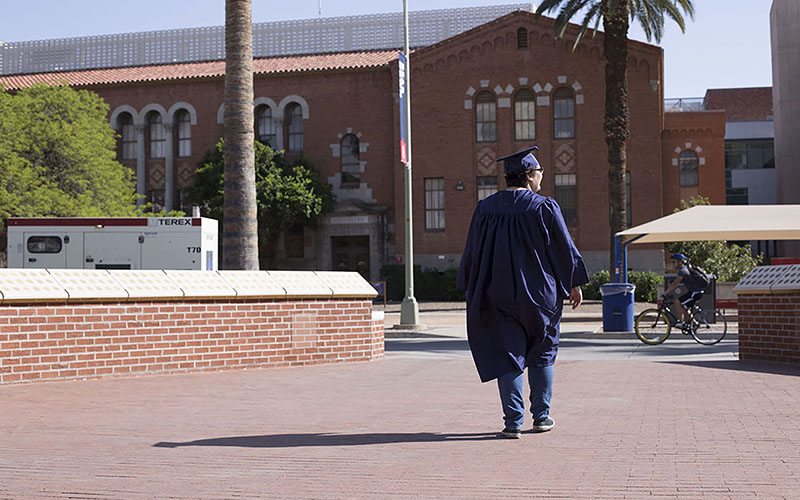WASHINGTON – More than 10,000 Arizonans could see $111.9 million in federal student loan debt erased as part of a $5.8 billion loan discharge announced this week for former students of the now-defunct Corinthian Colleges.
It is the largest such action by the U.S. Department of Education, which said it could affect 560,000 former students at Corinthian, which operated nationwide and owned Everett, Heald and WyoTech colleges. Everett College had locations in Phoenix and Mesa.
Students claim they were duped into taking excessive loans by the for-profit colleges, based on bogus claims of job placement rates for their graduates, in a scheme that they said targeted minority and low-income students.
Student advocates said there are still many problems the government needs to address with for-profit colleges, but that they were “crying tears of joy” over this week’s announcement.
“As of today, every student deceived, defrauded, and driven into debt by Corinthian Colleges can rest assured that the Biden-Harris administration has their back and will discharge their federal student loans,” Education Secretary Miguel Cardona said in a release announcing the move Wednesday.
Rep. Raul Grijalva, D-Tucson, called the move “great progress and welcome news.” The Education Department said 10,210 of the affected borrowers were from Arizona.
“These students were preyed upon with false promises of a quality education and saddled with crushing student debt in the process,” Grijalva said in a statement Thursday. “This debt relief will lift a significant weight off the shoulders of many people and working-class families.”
The announcement is the most-recent action against for-profit colleges, which have been scrutinized by regulators over claims they misrepresented job-placement rates and targeted low-income prospects who were urged to take out federal loans for what turned out to be useless degrees.
It was also a victory for Vice President Kamala Harris, who came to the Education Department Thursday for an event celebrating the announcement. Harris was California attorney general in 2013 when she sued Corinthian Colleges for “false and predatory advertising, intentional misrepresentations to students, securities fraud, and unlawful use of military seals in its advertisements.”
That complaint charged that Corinthian claimed job placement rates as high as 100% in ads that mainly targeted low-income prospective students. It also said the school defrauded investors by presenting nationwide placement rates of 68.1%, knowing it was false.
A California superior court judge agreed, awarding a $1.1 billion dollar judgment for California students against the college system.
Harris on Thursday called the department’s action a win for those “wrongfully targeted by the for-profit college scam” and “justice for everyone defrauded by Corinthian Colleges.”
Corinthian closed some of its nationwide campuses abruptly in April 2015, including the Everest College campuses in Arizona, after it was fined $30 million by the Education Department for misrepresenting job placement numbers. Its remaining colleges were later sold to Zenith Education, now Educational Credit Management Corp., after it filed for bankruptcy in May 2015.
Student loan cancellation advocates, some of whom had been targeting Corinthian Colleges for years, also welcomed the news.
Hannah Appel, the co-founder of Debt Collective, a “debtors union” that has been advocating for debt cancellation for about 10 years, said she was “crying tears of joy.” Her group has been working with a network of advocates, including the “Corinthian 15” – the 15 students refused to make student loan payments to the Education Department for their Corinthian loans.

Vice President Kamala Harris in a 2021 file photo. Harris, who sued Corinthian Colleges when she was California’s attorney general, praised the Education Department decision to erase $5.8 billion in federal loans held by 560,000 former Corinthian students. (Photo by Lawrence Jackson/The White House)
Catrina Beverly, a debt striker who attended Heald College in Corona, California, from 2013 to 2014, decided to join the strike because she was not getting any job offers and felt duped.
“They showed me this graphic of the claim that they had a placement rate of 81% of all graduates,” Beverly said. “I couldn’t even get a single call for an interview no matter how many resumes I sent out after graduating.”
Hers was one of the first groups to get their student loans removed in 2017. She said it was a huge relief for her and this week’s news makes her “excited and elated to find out that everyone that attended these colleges is finally going to get the full release as needed.”
Appel said Corinthian intentionally targeted Black and brown communities, particularly Black women, by geofencing their neighborhoods, making aggressive recruiting calls, with promises of child care and guarantees of jobs after graduation. She said the company also targeted single mothers and disabled veterans.
The Corinthian action follows a similar announcement in February, when the Education Department announced $415 million in debt relief for former students of DeVry University.
Appel welcomed the loan cancellations, but was not ready to pat the department on the back, saying it is still “aiding and abetting” for-profit colleges by approving loans to attend those schools even though they continue to mislead prospective students.
“If we cancel all student debt, that’s wonderful,” Appel said. “But if we don’t actually fix the root of the problem with driving the debt, then it’s just going to happen all over again.
“We advocate for the full student debt cancellation with no term, no means processing, no application process, and then a federal reinvestment into public education,” she said.
But until that happens, some are just hoping that this is a sign of additional relief for more borrowers in the near future.
The National Student Legal Defense Network, which has represented students in lawsuits against for-profit colleges they attended, called Wednesday’s cancellation “long overdue.” It said in a prepared statement that it hopes the recent action is a “sign that other decisions are on the horizon for thousands of similarly situated students who are waiting for this kind of relief.”


